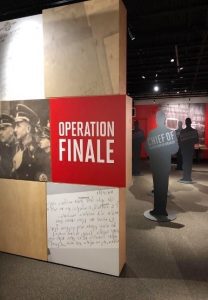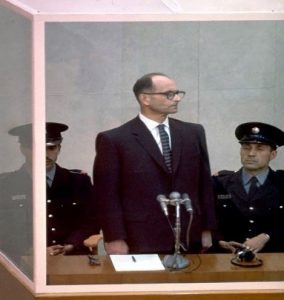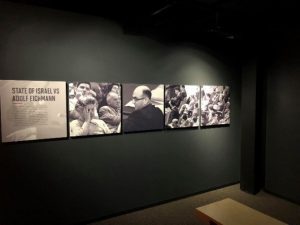The Importance of Media in the Trial of Adolf Eichmann
Zoe Wright, Public Relations Intern at The Florida Holocaust Museum
The Florida Holocaust Museum’s display of Operation Finale: The Capture and Trial of Adolf Eichmann is the very first exhibition in the United States that offers an inside look into the capture and trial of a Nazi war criminal.

The exhibition is co-produced by the Mossad-Israel Secret Intelligence Service; Beit Hatfusot – The Museum of the Jewish People, Tel Aviv, Israel; and the Maltz Museum of Jewish Heritage, Cleveland, Ohio.
Adolf Eichmann was one of the leading organizers of the Holocaust. He organized the mass deportation of Jews to ghettos and extermination camps in World War II. After the war, Eichmann fled to Austria until 1950. Then, he moved to Argentina using false papers. Israel’s intelligence agency, Mossad tracked Eichmann down and captured him. The brought him to Israel to stand trial on 15 criminal charges.
Eichmann’s trial was one of the first in history to be completely televised. In today’s society, it is hard to imagine a criminal trial without complete news coverage. Victims and their families of horrible events have been given a platform to address the public and share their experiences. In addition, the details of criminal’s backgrounds and motives are released.

The media has granted many people the opportunity to speak out on issues that have personally affected them. For instance, the student movement calling for gun control following the Marjory Stoneman Douglas High School shooting would not have received such a tremendous amount of momentum and public support if it was not for the coverage of news media. Students organized marches, speeches, and have a very large social media presence. They are doing everything in their power to keep the memories of their classmates alive while demanding change. Likewise, the coverage of the Eichmann trial prompted an openness and provided a platform for Holocaust survivors to speak out.

Not only was the trial a chance for justice to be served, but people were able to hear personal accounts of the Holocaust that had not been heard before.
The Eichmann trial put human faces to the unthinkable conditions of the Holocaust. Deborah Lipstadt, a historian and professor of religion and Holocaust studies at Emory University said, “There was a march of survivors, I would say approximately 100 survivors, who came into the witness box and told the story of what happened to them. And people watched them and listened to them and heard them in a way they hadn’t heard them before.” The world was their audience and they had the opportunity to share their story.
Holocaust survivor and witness to the selection process in the Auschwitz concentration camp, Joseph Zalman Kleinman was a witness at the Eichmann trial. He said that “[The Eichmann Trial] saw to it that all the world would know what had happened to us during the Holocaust. Without this trial, many things would never have become known, and history would have passed quietly over the whole matter.” The horrific experiences of the Holocaust will not be forgotten.
Operation Finale: The Capture and Trial of Adolf Eichmann is open to the public until July 15, 2018. If you have not viewed this powerful exhibit yet, be sure to visit The Florida Holocaust Museum before it closes.
